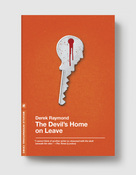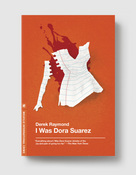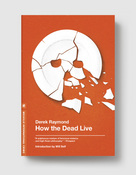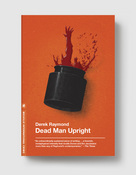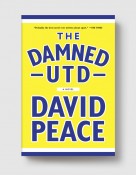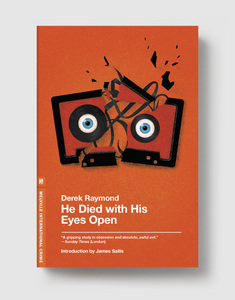
List price: $14.95
- Pages240
- ISBN9781935554578
- Publication dateOctober, 2011
- Categories
- Booksellers
- Media
- Academics & Librarians
He Died with his Eyes Open
Factory Series Book 1
Derek Raymond
Introduction by James Sallis
Part of Melville International Crime
”Unrelenting existentialist noir—as if the most brutal of crime fictions had been recast by Sartre, Camus, or Ionesco while retaining something of the intimate wise-guy tone of Raymond Chandler and Dashiell Hammett.” —Joyce Carol Oates, The New York Review of Books
Murders are a dime a dozen in Margaret Thatcher’s London, and when it comes to the brutal killing of a middle-aged alcoholic found dumped outside of town, Scotland Yard has more important cases to deal with.
Instead it’s a job for the Department of Unexplained Deaths and its head Detective Sergeant. With only a box of cassette-tape diaries as evidence the rouge detective has no choice but to listen to the haunting voice of the victim for clues to his gruesome end.
The first book in Derek Raymond’s acclaimed Factory Series is an unflinching yet deeply compassionate portrait of a city plagued by poverty and perversion and a policeman who may be the only one who cares about the “people who don’t matter and who never did.”
Praise for Derek Raymond’s Factory Series
“[The Factory series is ] majestically gloomy.” —Richard Price, New York Times Book Review
“The Factory novels are certainly the most viscerally imagined of their kind that I’ve ever read, or reread multiple times. Derek Raymond wrote in a supposedly escapist genre in a manner that precluded any hope of escape.” —Scott Phillips, bestselling author of The Ice Harvest
“It’s one of the darkest and most surrealistically hard-boiled things I’ve ever read. The detective is at least as scary as the murderers he’s chasing.” —William Gibson, bestselling author of Neuromancer
“A gripping study in obsession and absolute, awful evil.” —Sunday Times
“No one claiming interest in literature truly written from the edge of human experience, no one wondering at the limits of the crime novel and of literature itself, can overlook these extraordinary books.” —James Sallis, author of Drive
“The Factory novels are certainly the most viscerally imagined of their kind that I’ve ever read, or reread multiple times. Derek Raymond wrote in a supposedly escapist genre in a manner that precluded any hope of escape.” —Scott Phillips, bestselling author of The Ice Harvest
“There remains no finer writing – crime or otherwise – about the state of Britain.” —David Peace, author of ”The Red Riding Quartet.”
“Carve Derek Raymond’s name into the literary pantheon. He is one of the rare authors who seek to understand evil, ferret out the darkness in human nature, and blast Noir fiction out of the genre ghetto and into Literature. His nameless detective’s quest through the bleak streets gets under your skin. Amazing, painful and brilliant.” —Cara Black, bestselling author of Murder at the Lanterne Rouge
“More Chandleresque than Chandler… [Raymond] could write beautifully…and, more importantly, what he is writing about in this novel are nothing less than the important subjects any writer can deal with: mortality and death.” —Will Self, author of The Quantity Theory of Insanity
“Beyond hard boiled.” —Patton Oswalt
“The book is beautifully written, grimy as some of the characters are. Mr. Raymond is a master of the sharp vignette, the telling phrase, the speech patterns that perfectly describe a character. All of the people in his book are vividly alive.” —New York Times
“A crackerjack of a crime novel, unafraid to face the reality of man’t and woman’t evil.” —Evening Standard
“For all its bleakness, violence and death, there is something touching and optimistic about the unnamed detective’s utter belief in the worth of every human being, no matter how marginalized or alienated from society … totally addictive reading.” —Boston Bibliophile
